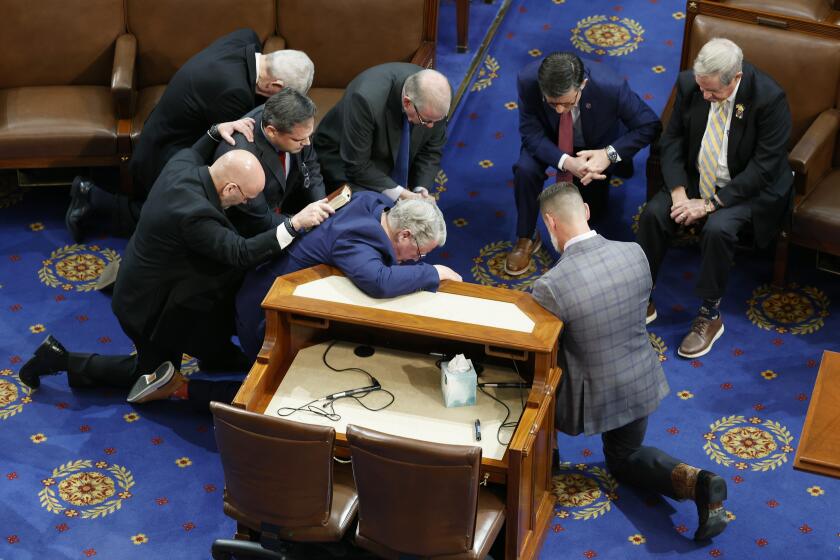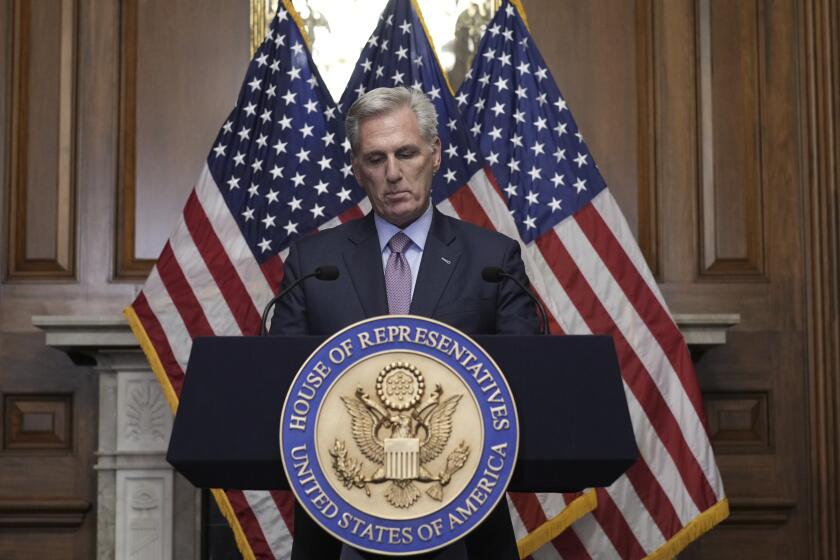California holds the key to GOP power in the House. McCarthy’s retirement makes everything harder

- Share via
WASHINGTON — With Kevin McCarthy heading for the exits, his Republican colleagues are bracing for a falloff in campaign support and loss of granular institutional knowledge that could leave them at a disadvantage heading into next fall’s elections.
The fight for control of the closely divided House will likely be decided in California, the ex-speaker’s home state. Five of the state’s 12 Republicans — Young Kim of Anaheim Hills, David Valadao of Hanford, Mike Garcia of Santa Clarita, Michelle Steel of Seal Beach and John Duarte of Modesto — hold districts President Biden won in 2020. A sixth Golden State Republican, Rep. Ken Calvert of Corona, also faces a competitive race.
But McCarthy’s announcement that he’ll leave Congress at the end of the year means the GOP will be without the man who convinced many of them to run for office in the first place — not to mention one of the most prolific fundraisers in party history. That complicates Republicans’ path to maintaining their historically narrow majority. His replacement, Speaker Mike Johnson (R-La.), is a neophyte at political leadership with a long history of hard-line social conservative stances that might not play well in the districts that will determine House control.
“It’s terrible. There’s nothing good about losing McCarthy,” Rep. Dan Crenshaw (R-Texas) told The Times.
McCarthy’s greatest strength as a politician has been his political capability. He’s a campaign animal, more interested in and adept at recruiting candidates and raising money than crafting policy.
Since 2012, McCarthy’s leadership PAC spent over 10 times more on private jets, restaurants and lodging than other congressional leaders did.
He played a key role in building out the House GOP’s super PAC efforts over the past decade-plus beginning in 2010, has deep ties to megadonors and K Street lobbyists, and his close relationships with swing-district lawmakers — many of whom he personally recruited to run for office — helped propel him to the speakership.
Now, he’s on the way out. And Johnson, his replacement, is learning on the fly what it means to be in charge of the party’s campaign efforts.
Rep. Garret Graves (R-La.), a close McCarthy ally, said he was worried about the steep learning curve his home-state colleague faces as he settles into the speakership, as well as the loss of connections and institutional knowledge that are leaving with McCarthy.
He called Johnson “very smart,” but said “there’s a lot to learn.”
“Obviously, the fundraising stuff is something that he doesn’t have the background on. But I think that there’s an apparatus that’s in place that McCarthy put together that is amazing, and I think that’s gonna give him a big head start,” Graves said.
Johnson has never spent much time fundraising — he hails from a safe seat and hasn’t done much campaigning for others in past years. Before he became speaker, Johnson had raised just over $5 million in his six-plus years in Congress. He’d brought in just over a half-million dollars in the first three quarters of 2023, compared to $15 million for McCarthy, who helped the National Republican Congressional Committee raise more than $40 million last cycle alone.
Republican lawmakers and campaign aides say Johnson is working hard to introduce himself to key donors and getting help from McCarthy in his circle — but concede that he starts at a disadvantage.
“Look, there’s going to be less money, I’m sure. How much, I don’t know,” Crenshaw said.
The transition of House speakership from McCarthy, a proud but subdued Christian, to Johnson, a fervently devout evangelical, highlights the religious right’s dominance of the evangelical GOP coalition.
On top of that, McCarthy comes from California and knows the Golden State well. His exit means there are no GOP House leaders from either of the two states that strategists of both parties think will determine House control next fall. Six of the GOP’s 22 most vulnerable House seats in the Cook Political Report’s analysis are in California, while five are in New York. McCarthy’s deep understanding of California politics has been replaced by a man who built his career in the religious right and represents a deeply conservative Deep South district in northern Louisiana. That’s not good news for vulnerable California Republicans.
House GOP strategists acknowledge that McCarthy’s California expertise would have been invaluable, but say that his exit isn’t going to change their plans to heavily spend in the state.
“You look at the map, and the majority is won or lost in California and New York. We’re not going to throw out the baby with the bathwater,” said one House GOP advisor granted anonymity to give a candid assessment of the party’s strategy.
McCarthy has pledged to stay involved and help the GOP retain its House majority.
“I will continue to recruit our country’s best and brightest to run for elected office. The Republican Party is expanding every day, and I am committed to lending my experience to support the next generation of leaders,” he wrote in his Wall Street Journal op-ed announcing his retirement.
He chaired a recent fundraising dinner for the Congressional Leadership Fund (CLF), and has helped introduce Johnson to some donors.
But he’s clearly taking a step back. McCarthy did not bother showing up to vote on a series of measures on Wednesday and Thursday following his announcement that he’d retire.
Johnson hasn’t looked to make waves with the GOP’s campaign apparatus. He kept in place the entire infrastructure of the CLF and American Action Network (AAN), the major outside groups that McCarthy and his predecessors have used to funnel large donations into campaign spending. He’s done the same with the National Republican Congressional Committee, House Republicans’ official campaign arm, and has brought on NRCC Chairman Richard Hudson’s (R-N.C.) former chief of staff as his new political director. His first major D.C. fundraiser last week brought in $4 million, and House Republicans’ online fundraising has ticked up from its nadir during the speakership fight.
“Speaker Mike Johnson showed an immediate commitment to growing the majority when was handed the gavel, and we are thankful that his hard work is already delivering results,” said NRCC Communications Director Jack Pandol.
Johnson’s political team didn’t respond to an interview request.
Rep. Kevin McCarthy will give up his Bakersfield seat after nearly two decades in Congress, leaving House Republicans with an even slimmer majority.
The CLF and AAN raised a combined total of $16 million in the first 10 days of Johnson’s speakership. (They’d brought in $80 million combined in the nine months before McCarthy’s ouster, outpacing their 2022 fundraising through September by $20 million; they raised $645 million total during McCarthy’s five years as the top House Republican).
Crenshaw said that major GOP donors have stepped up in recent weeks to “make a show of force” and “signal that this is not going to be a disaster for Republicans.”
Former House Speaker Nancy Pelosi (D-San Francisco), a prodigious fundraiser herself, has stuck around since stepping down from House leadership to help the new generation of Democratic leaders through the transition — and has helped the party avoid a dropoff in fundraising. The 83-year-old is running for another term, and will still be there after the 58-year-old McCarthy departs.
Did she ever think she’d outlast her Republican colleague in the House? “I didn’t think about him at all. Period. Zero,” she told The Times. “Once you’re gone from here, you’re gone from here.”
She declined to further discuss the potential impact McCarthy’s exit would have on the fight for House control.
Rep. Marjorie Taylor Greene (R-Ga.), a conservative firebrand who emerged as one of McCarthy’s closest allies during his speakership fights, said she was frustrated with how Johnson is running the House so far.
“Anybody that’s paying attention should be noticing that there’s literally no change and if not things are worse,” Greene told reporters on Thursday.
But she didn’t think that losing McCarthy would have much impact on which party will win the House next year.
“Not at all,” she said when The Times asked whether McCarthy’s exit would hurt the GOP’s chances. “Trump’s going to drag everybody across the line. You’re going to see voter turnout like you’ve never seen before, so I’m not worried about that.”
Why do a soul-crushing job with a 3,000-mile commute when you could do something else? Californians who’ve left Congress say they don’t miss it at all.
Greene is likely at least partly correct. The presidential race will increase turnout in 2024, and control of the House, which appears to be on the knife’s edge, could well be determined much more by how voters feel about Trump and President Biden than by specific House candidates or fundraising.
Johnson’s hard-right views, especially on social issues, so far haven’t kept swing-district Republicans from wanting to campaign with him. He recently appeared at in-district fundraisers for a trio of vulnerable freshman Republicans from suburban New York.
But he raised eyebrows with a recent fundraising email. The email, which the NRCC sent out under his name, was steeped in hard-right Christian rhetoric and warned that God might take vengeance on America for its “depraved culture” if the U.S. doesn’t change course fast.
“I fear America may be beyond redemption,” he wrote, citing the rise in the number of teenagers who identify “as something other than straight.”
“America needs to recognize that we have much to repent for if we want to avoid the judgment we so clearly deserve, but that starts with returning America to God’s good graces once again,” Johnson declared in the fundraising email.
Rep. Don Bacon (R-Neb.), who has won a series of close races in his Omaha-based swing district, said he’d be happy to have Johnson come in and campaign for him.
But he said that the chaos of October “hurt us,” and McCarthy’s political acumen is irreplaceable.
“God made that guy to be a political maven. He does things nobody even thinks about,” Bacon said.
Why do a soul-crushing job with a 3,000-mile commute when you could do something else? Californians who’ve left Congress say they don’t miss it at all.
Bacon met McCarthy years before he ran for office, and said that McCarthy identified him as a possible House recruit long before he’d ever thought about running. McCarthy was also so astute at reading his colleagues that he intuited that Bacon might vote against Ohio Rep. Jim Jordan’s attempt to become speaker because he was so “pissed” about McCarthy’s ouster. As McCarthy delivered a floor speech, Bacon was stewing in his seat — until he got a text from his wife that McCarthy’s wife had called her to have her relay a message: “I know Don’s mad right now, tell him we love him,” and “please don’t be too mad.”
“We lost a talent,” he said. “Nobody can campaign like this guy. And nobody can raise money like this guy. And he recruits really good recruits. I think Mike Johnson can get there. But let’s be honest: McCarthy has worked this for like two decades. This guy has built this machine. So it’s a loss,” he said. “McCarthy is one of a kind.”
More to Read
Get the L.A. Times Politics newsletter
Deeply reported insights into legislation, politics and policy from Sacramento, Washington and beyond. In your inbox twice per week.
You may occasionally receive promotional content from the Los Angeles Times.















